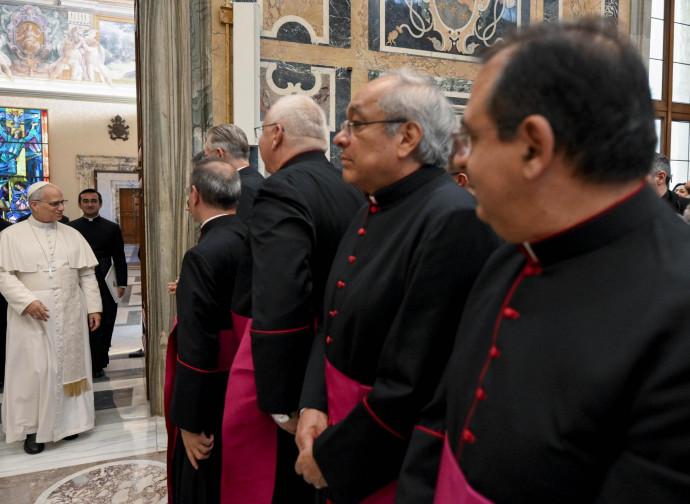Pope Leo puts Mitis Iudex back on track: 'Nullity in truth'
'No false mercy in canonical matrimonial trials': words that go against the current trend towards openness. Addressing the Roman Rota, Pope Leo does not disavow his predecessor's reform, but brings it back into line with Wojtyla and Ratzinger.

In his address to participants in the international course promoted by the Roman Rota, Leo XIV quoted Francis four times, and Benedict XVI and John Paul II once each. However, the programme of his speech seems to suggest a desire to align Bergoglio's reform of the marriage annulment process with that of his two predecessors.
Friday's speech in the Clementine Hall appears to contradict the openness seen in the implementation of Mitis Iudex. Starting from the title of the course, 'Ten Years After the Reform of the Canonical Matrimonial Process: Ecclesiological, juridical and pastoral dimensions), Leo XIV rejected the tendency to separate and even contrast these three approaches, stating that 'the more theological or pastoral approach is not less juridical, and vice versa, the more juridical approach does not detract from the other two profiles'. This echoes Benedict XVI's words at the inauguration of the judicial year in 2006. Regarding marriage annulment processes, Ratzinger warned against pastoral charity 'sometimes contaminated by complacent attitudes towards people'. These attitudes are only pastoral in appearance, the German Pope warned, but are counterproductive if undertaken without regard for the truth.
Pope Leo implicitly echoed this position in his speech, refocusing attention on ascertaining the truth in this type of process as the authentic source of justice for individuals. The Pope, who is also a canonist, drew attention to the 'ecclesiological presuppositions', of which he wanted to 'recall two in particular: the first concerning the sacred power exercised in ecclesiastical judicial processes in the service of truth; and the second concerning the object of the process for the declaration of the nullity of marriage, that is, the mystery of the conjugal covenant'. Thus, Benedict XVI reaffirmed that marriage is indissoluble by divine right.
Another important feature of the papal address was the attention given to the process, which was no longer dismissed as a waste of time. Prevost said that ‘the judicial function, as a means of exercising the power of government or jurisdiction, is fully part of the overall reality of the sacred power of pastors in the Church’, and explained that ‘a fundamental aspect of pastoral service operates in judicial power: the diaconia of truth’.
While Francis favoured the administrative route, Leo XIV called for the proper exercise of judicial power. The Argentinian pope was keen to streamline procedures to help people 'travel as smoothly as possible' along the path of verifying marriage validity. On the other hand, Prevost's speech offered an interpretation of Mitis Iudex that attempted to close the stable door after all the horses had bolted. The emphasis seems to be on the 'imperative requirements of justice, which cannot be waived on the basis of misguided compassion', and on the fact that 'human judgement on the nullity of marriage should not, however, be manipulated by false mercy'.
However, speeding up marriage annulment procedures is no guarantee of pastoral charity, since the latter must always go hand in hand with the truth. Often, streamlining procedures does not facilitate the ascertainment of the truth — quite the contrary. Leo did not shelve or repeal Mitis Iudex; he simply put it back on track. On Friday, the Pope said that 'the purpose of the reform, aimed at accessibility and speed in the processes but never at the expense of truth, thus appears as a manifestation of justice and mercy'. In short, the American Pope's intervention dispels the notion that a failed marriage is automatically null just to fulfil the desires of one or both spouses.
Recalling that 'another theological presupposition, specific to the process of marriage annulment, is marriage itself, as founded by the Creator', Leo XIV evokes natural marriage, which, for the Church, is not separate from the sacrament. This conveys greater confidence in the possibility of a man and a woman marrying and remaining faithful to their union. Insisting on facilitating the verification of nullity, on the other hand, conveyed the opposite message, as if marriage were something for a select few.
In valuing the institution of the judicial process, Leo XIV emphasises that it is not a 'cumbersome accumulation of procedural requirements', but rather an 'instrument of justice'. It is therefore significant that he mentions the participation of the defender of the bond, which, as Benedict XVI recalled, was made mandatory by a canonist pope like himself: Benedict XIV. This presence is necessary because, as Prevost told the course participants, 'in the declaration of marriage nullity, a public ecclesial good is involved.' In other words, marriage is a public good and does not belong to the two parties alone.
It is also significant that the Pontiff from Chicago praised 'the effort to promote reconciliation between spouses, including, when possible, through the validation of the marriage'. In recent years, it has almost been forgotten that the Church is responsible for encouraging reconciliation and validation when the conditions for doing so exist. While Prevost cannot and does not wish to repeal the controversial reform of the marriage annulment process inherited from Francis, there is no doubt that his speech on Friday will pave the way for a different judicial practice to that required in recent years. Hopefully, procedural rigour based on truth will prevail over the temptation of some justice officials to be guided by 'false mercy'.
